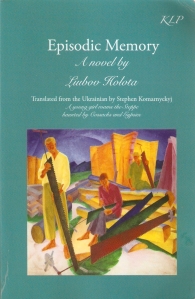Episodic Memory by Liubov Holota and translated by Stephen Komarnyckyj, Kalyna Language Press, 2015
Cover of “Episodic Memory” with Oleksander Bohomazov’s “Stropping the Saws”
“ … a thick frost gripped the orchards and homesteads of Lyubymivka with such a fabulous beauty that every twig, every stalk of every weed, and the grass on the surrounding pasture, exhaled its living moisture to the last drop. It played with the sombre colours of autumn’s sorrow and the dazzling whiteness of crystallised ice and its small, innocent celestial flowers. Even the muddy puddles glazed over with a brittle tracery of patterns, and the edges of the transparent pond became as if covered with a sugary froth because of the chill. The electrical wires hung low with a feathery, white down left by some unseen migratory flock of ice birds.”
This quote from Liubov Holota’s novel “Episodic Memory” is representative of the lyrical, poetic style of this fictionalized memoir of a woman’s life (she is described, throughout most of the book as ‘the woman’ or ‘the girl’), beginning in a 1950s steppe village up to the first decade of post-Soviet, independent Ukraine. The memories described are indeed episodic, framed by her 40-day vigil for her dead mother in their family home. Her life, as part of the post-war “baby boom” generation is described through vignettes of life with her mother, her father, her grandparents, and school as well as stories of her neighbors’ lives. Though these scenes of her early years are vivid and poignant, for some the accounts of her adult life in the “stagnation” of the 70s and 80s, with their deadening Soviet social oppression and the implied, but telling, examination of the independent 90s will be more interesting.
Another quote from the novel:
“I am seized with nostalgia for my grandfather’s house and my barefoot childhood … you are able to stir the spirit and make one’s hair stand on end …”
This is voiced by another, not particularly savory character and in a perhaps ironic way. However, while the positive connotation of ‘nostalgia’ does not totally fit the woman’s life, the sentiment does serve to illustrate how memories, of the family home and childhood, of one’s place of birth, have an overpowering hold on many of us. This is, in some scenes, juxtaposed with the woman’s younger brother, who left the village and the country, as soon as he could, with never the urge to look back.
The British translator, Stephen Komarnyckyj, does his usual stellar job of rendering the Ukrainian into English. He has a commanding understanding of what Ms. Holota writes and an accomplished manner of transforming it into an equivalent English text. This novel should be read for many reasons, but, if for no other, as an example of how translation can be done.

